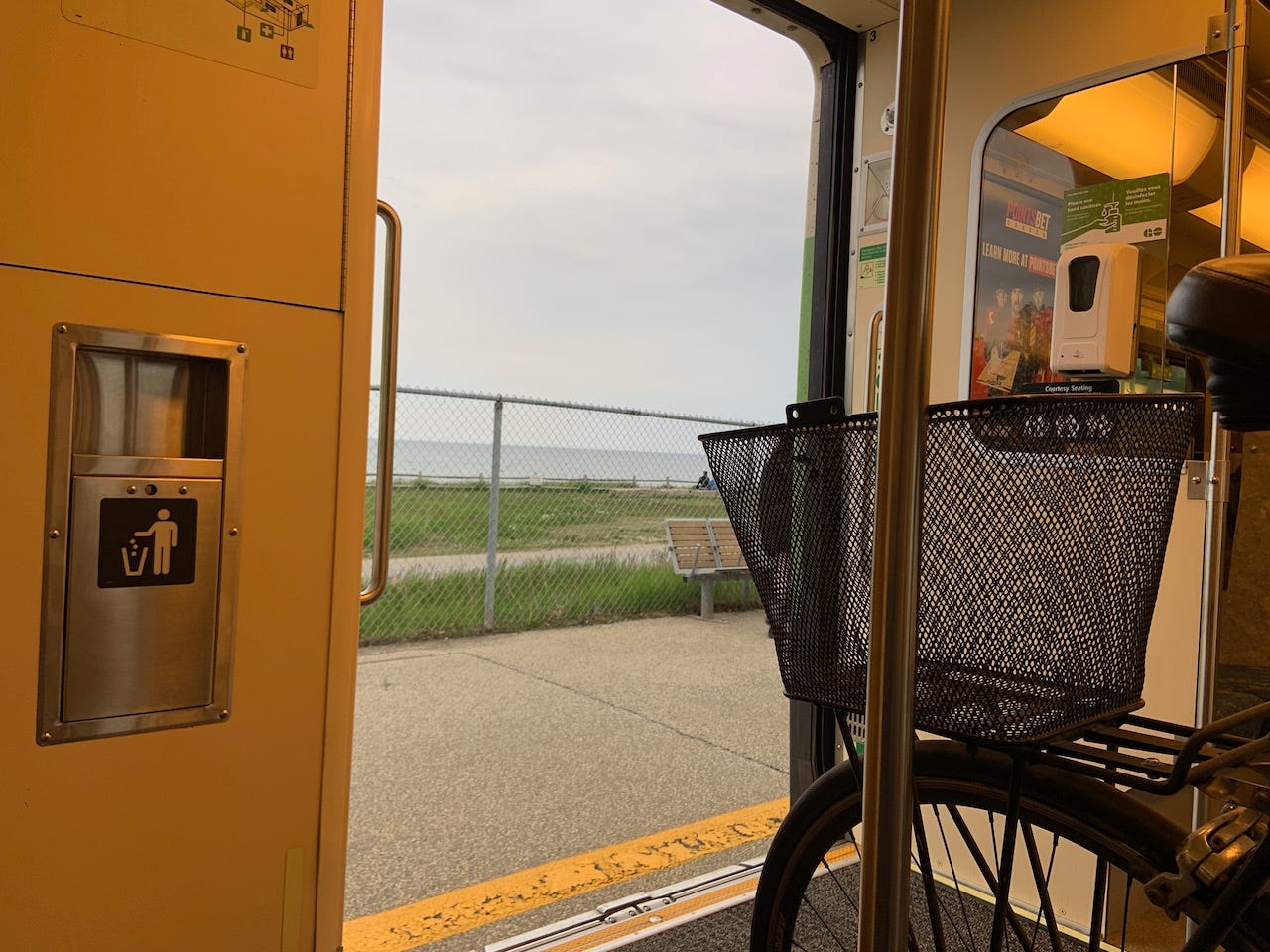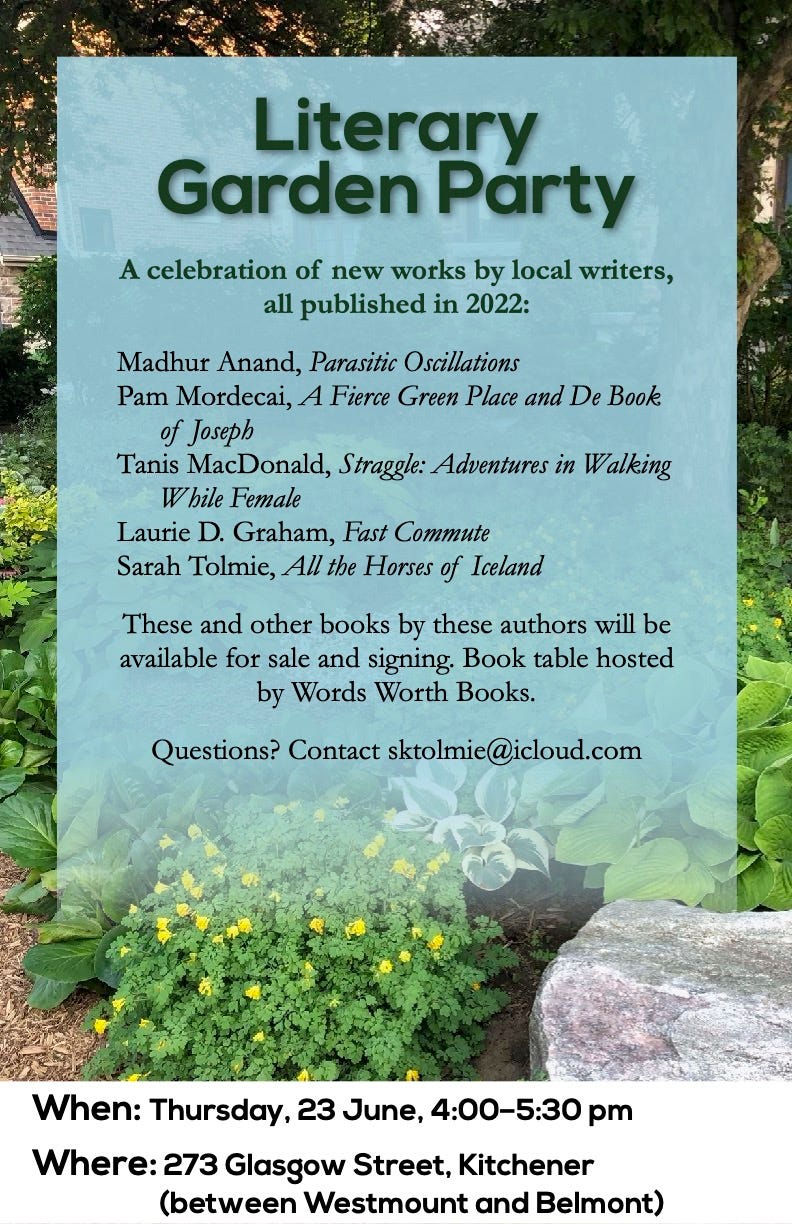Bike (a breeze), then bus (a milk run, ridership obliterated, routes condensed), then train (slow and empty), then bike again (lovely, but always so many vehicles idling in the bike lanes or construction swallowing them up, and it occurs to me that the start of this parenthetical could be Toronto’s slogan: “Lovely, but...”). Door-to-door, three-and-a-half hours one way. Makes no earthly sense to navigate such a trip but for need, or for determined intent. On Wednesdays the retired women of Peterborough would do it to catch a Mirvish show, make a day of it. Completely unsustainable more than once or twice a week.
Takes half that time, give or take, in a car, but it feels like you’ve given more for it, and my lands, have you ever. More effort, more “energy,” more attention, more exhaustion, locked in your car, toggling the cruise control on and off and the hands corralling the wheel and the eyes watchful, just you and your big metal hunk of conveyance and the infrastructure responsible for your day’s little objectives.
It seems incredible to me that so many people could be pursuing their private aims in this public way. But are cars people? — Rachel Cusk [i]
The commute returned after a long hiatus (a hiatus for most, that is). I’ve always been a part-timer on these routes. A tiny sprinkle on the half-donut around Toronto, transporting myself into The Big Half-a-Donut-Hole. Pulling my shift at the Brick factory. I got it pretty good, you know.
Or a pooch on a tether, and the city is the stake. That beagle last week on my walk to the polling place to attempt to unseat the blue guy—always that moment behind the screen, no matter how abysmal the contest: that I have the right to mark a ballot, that it will be counted, that I won’t be harmed for marking it, that the results won’t be undermined, that there’s a chance this won’t always so—young beagle tail banging on the sidewalk as I approached, spirographing at the end of his lead, galumphing up at me, straining for contact.
Home is wherever you are not. — Helen Hajnoczky [ii]
That blasted lumbering commuter train. It’s a miracle that it even exists. Cripes, that direct train from Kitchener, assuming back then that all commuters are 9-to-5 commuters. Still, a miracle. That slow, sparsely scheduled, diesel-powered train is where I came up with so many pages of my book. (I’m going back to Kitchener, June 23, to read from it! Full info at the very bottom of this missive. I have yet to sort out the route, to arrive at the punchline of how many hours it would take to get from my current sprinkle to my previous one if I want not to drive.)
It all feels like a previous age, sitting on that empty train. The sleeping faces crammed on the top floors of the train cars, the heaps of hanging jaws. The top floor, The Quiet Zone, strictly, viciously passenger-enforced. The wish to succumb to exhaustion in peace—and for me, the wish to not have to hear other people’s words while staring out the windows. Your wish granted in The Quiet Zone, in the peace of in-betweenness, a moment of reprieve, time that’s not exactly your own but a sort of extended pause, a pause that you defend, and woe to any who interrupt that. One time I looked up from my book, train shooting out of the Donut Hole, and every person within sight had fallen asleep. How many times a chorus of snoring. And how many times would I look around and every person would be looking at a phone, sometimes myself included. Depleted. Whopping boredom. Time-waster. Can’t pull your eyes off it.
On my trips, the whole train is The Quiet Zone now.
We must live simultaneously in nature and history, though we forever are tempted by those prophets who tell us we can only take full refuge in one or the other. — Alan Jacobs [iii]
The bus carries you past the farms and over the moraine. The train delivers you through the industrial zones and the suburbs. There’s a stretch, around the Rouge Hill stop, that has you riding beside Lake Ontario. Some would raise their heads for that stretch of the route, look out at the water.
And on other stretches, you’d be running alongside the endless singular people driving along the 401, to and fro in a way that won’t eat up their entire day, and yet somehow still does. The grind before the grind. The grind after the grind. I learned not long ago that there used to be a train line between Peterborough and Penetanguishene. We’ve grown so individual in our aims.
Inside that bus, we didn’t miss the sounds of the birds we didn’t hear, and moving that fast we couldn’t remember who we belonged to. — Michelle Porter [iv]
I used to see a lot of deer on the train from Kitchener. A couple of coyotes. Hawks. Wild turkeys. Birds of all kinds. Often passing so much too quickly to see much of anything, only getting senses of. All the endless creeks and rivers feeding into the lake. And still that mass insistence: we’re going too slow.
[i] Rachel Cusk, “Driving as Metaphor” in Coventry: Essays (HarperCollins, 2019).
[ii] Helen Hajnoczky, “Otthon” in Magyarázni (Coach House, 2016).
[iii] Alan Jacobs, “The Love Feast: Seeing Auden in a New Light” in Harper’s Magazine 344/2064 (May 2022).
[iv] Michelle Porter, Scratching River (WLUP, 2022).








